Confirms near term production potential in Nevada
Post-Tax IRR 81%, NPV $121M, 1.3yr pay-back, 9-yr mine life at 38,000 oz gold pa
VANCOUVER, British Columbia, July 31, 2023 (GLOBE NEWSWIRE) -- Gold Bull Resources Corp. (TSX-V: GBRC) (“Gold Bull” or the “Company”) is pleased to report minor modifications to its Sandman Preliminary Economic Assessment (PEA or Scoping) which was previously announced on April 25th, 2023, and filed on June 9, 2023, titled Phase 2 Study at its 100% owned Sandman Project (“Sandman” or the “Project”) located in Humboldt County, Nevada, USA.
The modifications provided include the addition of post-tax financial analysis (previously only pre-tax was reported) and the addition of an independent metallurgical qualified person review, which resulted in the previously assumed recoveries increasing from 70% to 75% with multi-phase crushing.
The Sandman Scoping Phase 2 Study has identified a stand-alone, low pre-production capital USD31.5M, conventional heap leach gold project producing circa 35,000 to 40,000 ounces (average 38,000) of gold per year for 9 years. The project boasts an excellent pre-tax Internal Rate of Return (IRR) at 102% and a pre-tax payback period of 1.1 years, using a gold price of US$1800. The results from the Phase 2 study have Identified a post-tax IRR of 81% with payback period of 1.3 years.
The Scoping Phase 2 Study focused on mining gold mineralized material within optimized pit shells in two phases: Phase 1 mines all mineralized material within the pit shell above the water table and is dry (refer Phase 1 Study1), followed by Phase 2 which is focused on mineralized material below the water table and within the pit shell, and is wet, after completion of additional monitoring, permitting and dewatering efforts paid for by mine cashflow from Phase 1.
The Phase 1 and Phase 2 approach is designed to preserve initial pre-production capital during the Phase 1 mining process. The benefit of this two-phase approach is to enable further definition of the existing Mineral Resources, discover additional Mineral Resources, and enable sufficient time to conduct the below water table mine studies and permitting, all paid from the Phase 1 revenues. The proposed model has the potential to deliver strong organic growth with minimal initial dilution to existing shareholders.
|
Pre-Tax Results |
Post-Tax Results (2) |
| IRR |
102% |
81% |
| Cash Flow (Undiscounted) |
$229,585,644 |
$174,743,379 |
| Cash Flow 6% Discount Rate |
$161,092,882 |
$121,009,339 |
| Payback (Years) |
1.1 |
1.3 |
|
The Study highlights :
- Production rate average of 2.2 Mtpa for a 9-year operation
- 35,000-40,000 ounces of gold per annum produced from conventional heap leach, average 38,000 ounces per year
- At US$1,800/oz gold price:
- IRR of 81% (post-tax)
- NPV 6% US$121M (post-tax)
- Payback period of 1.3 years (post-tax)
- Average grade 0.73g/t gold
- LOM low strip ratio of 2.2:1
- Phase 1 Initial pre-production Capital $31.5M and Phase 2 Capital, US$19.7M paid by Phase 1 mining revenues. Total LOM capital US$51.3M, including pre-production working capital US$4.5M
- LOM Operating cost of US$20.85 per tonne (post tax)
- All in Sustaining Cost (AISC) of $1,337 (post-tax) per ounce
This Scoping Phase 2 Study focused on the efficient extraction of all mineralized material within an optimized pit shell in a sequence that facilitates effective use of initial pre-production capital and a more rapid mine commissioning. This Scoping Phase 2 Study is a Preliminary Economic Assessment PEA (PEA), under NI 43-101 requirements.
Gold Bull CEO, Cherie Leeden, commented:
Sandman provides Gold Bull with a low-cost and moderate mine life start-up with the opportunity to grow the asset via additional exploration using mine revenues. This is a practical approach to epithermal gold mining and has historically produced longer life assets.
In our Phase 1 PEA we only examined the oxide material located above the water table (5yrs), to enable a rapid timeline for mine commissioning and limited the initial pre-production capital. This Phase 2 scoping study focussed on extending the mine life from 5 years to 9 years while utilizing mine cashflow for Phase 2 development. The intent is to be mining, developing, and discovering additional ounces at the project utilizing mining cashflow and avoid shareholder dilution. Excellent exploration potential exists at Sandman and not all deposits are closed off.
Three gold resources at Sandman remain open, therefore this PEA is the most conservative base case done using only our pit constrained ounces at a gold price of US$1800. If we were to use today's gold price of circa <$2000, it dramatically increases the projected economics because Sandman is most sensitive to the gold price.
Economic analysis is provided in Table 1 and compares Pre-Tax and Post-Tax analysis.
| Metric |
Pre-Tax |
Post-Tax |
| Economic Analysis |
|
|
|
|
| Internal Rate of Return (IRR) |
102% |
|
|
81% |
|
|
| NPV @ 6% |
$161,092,882 |
|
USD |
$121,009,339 |
|
USD |
| Average Annual Cashflow |
$29,017,072 |
|
USD |
$22,923,487 |
|
USD |
| Undiscounted Cumulative Cashflow |
$229,585,644 |
|
USD |
$174,743,379 |
|
USD |
| Pay-Back Period |
1.1 |
|
years |
1.3 |
|
years |
| Gold Price Assumption |
$1,800 |
|
per ounce |
$1,800 |
|
per ounce |
| All-in Sustaining Cost |
$1,176 |
|
per ounce |
$1,337 |
|
per ounce |
| Capital Costs |
|
|
|
|
| Initial Capital |
$31,568,000 |
|
USD |
$31,568,000 |
|
USD |
| Working Capital (included in above) |
$4,500,000 |
|
USD |
$4,500,000 |
|
USD |
| LOM Sustaining Capital |
$19,739,240 |
|
USD |
$19,739,240 |
|
USD |
| Total LOM Capital |
$51,307,240 |
|
USD |
$51,307,240 |
|
USD |
| Contingency (Included in Total) |
$9,980,000 |
|
USD |
$9,980,000 |
|
USD |
| Operating Costs (Average LOM) |
|
|
|
|
| Mining |
$7.80 |
|
per ore tonne |
$7.80 |
|
per ore tonne |
| Processing & Support |
$5.65 |
|
per ore tonne |
$5.65 |
|
per ore tonne |
| General & Administration (G&A) |
$2.99 |
|
per ore tonne |
$2.99 |
|
per ore tonne |
| Other Costs |
$1.57 |
|
per ore tonne |
$4.40 |
|
per ore tonne |
| Total Operating Cost |
$18.03 |
|
per ore tonne |
$20.85 |
|
per ore tonne |
| Production Data |
|
|
|
|
| Life of Mine |
9 |
|
years |
9 |
|
years |
| Annual Processing Rate |
2,157,667 |
|
tonnes per annum |
2,157,667 |
|
tonnes per annum |
| Total Tonnes Processed |
19,419,000 |
|
tonnes |
19,419,000 |
|
tonnes |
| Grade Au (Average) |
0.73 |
|
g/t Au |
0.73 |
|
g/t Au |
| Contained Gold |
455,000 |
|
ounces |
455,000 |
|
ounces |
| Metallurgical Recovery Au (Overall) |
75% |
|
|
75% |
|
|
| Average Annual Gold Production |
37,917 |
|
ounces per annum |
37,917 |
|
ounces per annum |
| Total Gold Produced |
341,250 |
|
ounces |
341,250 |
|
ounces |
| LOM Strip Ratio |
2.2 |
|
: 1 |
2.2 |
|
: 1 |
Table 1. Scoping Study economic analysis summary of Sandman Project for both Pre-Tax and Post-Tax results.
STUDY HIGHLIGHTS
The Study has demonstrated potential for positive financial metrics for the Sandman Project based on a proposed stand-alone low-cost start-up heap leach gold mine project located approximately 25 km from the mining town of Winnemucca (Figure 1 and 2) in central Northern Nevada, USA.
This PEA Phase 2 Study investigated an expansion to the previously announced Phase 1 five-year mine plan of above water table mineralized material processed onsite via conventional Heap Leach processing AND includes the Phase 2 plan to mine the mineralized material below the water table after Phase 1 is finalized and after the necessary permitting and dewatering efforts have been completed. Gold Bull considers Sandman to be technically low risk, given the low strip ratio due to gold at surface and the majority of Mineral Resource classified as Indicated. Both Scoping Studies were completed to an overall +/- 30% accuracy using the key parameters and assumptions set out in Tables 1 and 2.
The calculations in this Phase 2 Study focus on the full project (prior Phase 1 plus this Phase 2) mining scenario. The Phase 1 mine scenario targeted low initial pre-production capital and near-term cash flow to then later fund Phase 2 below water table oxide mine dewatering studies and development. The strategy is to preserve initial pre-production cashflow and pay for future studies when producing revenue from the asset. The deferred work includes below water table permitting & dewatering, additional metallurgical optimization studies for product processing and infill resource to reserve drilling.
The Sandman Project Phase 2 Scoping Study includes Life of Mine (LOM) plan and reports a post-tax IRR of 81%, post-tax NPV6% of US$121M (post-tax), annual post-tax cashflow of estimated US$23Mpa, and a payback period of 1.3 years when applying presumed tax and a gold price of US$1,800/oz of gold. The initial pre-production capital cost is US$31.5M, which includes working capital of US$4.5M, and a further US$19.7M will be required as sustaining capital for additional mine studies, dewatering, and leach pad expansions. Total operating cost is $20.85 per tonne post tax (and all in sustaining cost of $1,337/oz gold (post-tax)). Royalty is low at 1.2% of product.
The Project is based on 455,000 gold ounces contained within the pit shells, with a head grade of 0.73 g/t gold spread across four known gold deposits. The four gold resources (see Figure 3: North Hill, Silica Ridge, South East Pediment, Abel Knoll) shall be mined via conventional open pit mining methods, with an average life of mine waste to ore ratio of 2.2:1, annual production is 35-40K oz gold (38,000 average), with 2.2Mt feed production rate. Refer Table 1 and Table 2 for further details and estimated financial metrics.
| Metric |
Pre-Tax |
Post-Tax |
| Economic Analysis |
|
|
|
|
| Internal Rate of Return (IRR) |
102% |
|
|
81% |
|
|
| NPV @ 6% |
$161,092,882 |
|
USD |
$121,009,339 |
|
USD |
| Average Annual Cashflow |
$29,017,072 |
|
USD |
$22,923,487 |
|
USD |
| Undiscounted Cumulative Cashflow |
$229,585,644 |
|
USD |
$174,743,379 |
|
USD |
| Pay-Back Period |
1.1 |
|
years |
1.3 |
|
years |
| Gold Price Assumption |
$1,800 |
|
per ounce |
$1,800 |
|
per ounce |
| All-in Sustaining Cost |
$1,176 |
|
per ounce |
$1,337 |
|
per ounce |
| Capital Costs |
|
|
|
|
| Initial Capital |
$31,568,000 |
|
USD |
$31,568,000 |
|
USD |
| Working Capital (included in above) |
$4,500,000 |
|
USD |
$4,500,000 |
|
USD |
| LOM Sustaining Capital |
$19,739,240 |
|
USD |
$19,739,240 |
|
USD |
| Total LOM Capital |
$51,307,240 |
|
USD |
$51,307,240 |
|
USD |
| Contingency (Included in Total) |
$9,980,000 |
|
USD |
$9,980,000 |
|
USD |
| Operating Costs (Average LOM) |
|
|
|
|
| Mining |
$7.80 |
|
per ore tonne |
$7.80 |
|
per ore tonne |
| Processing & Support |
$5.65 |
|
per ore tonne |
$5.65 |
|
per ore tonne |
| General & Administration (G&A) |
$2.99 |
|
per ore tonne |
$2.99 |
|
per ore tonne |
| Other Costs |
$1.57 |
|
per ore tonne |
$4.40 |
|
per ore tonne |
| Total Operating Cost |
$18.03 |
|
per ore tonne |
$20.85 |
|
per ore tonne |
| Production Data |
|
|
|
|
| Life of Mine |
9 |
|
years |
9 |
|
years |
| Annual Processing Rate |
2,157,667 |
|
tonnes per annum |
2,157,667 |
|
tonnes per annum |
| Total Tonnes Processed |
19,419,000 |
|
tonnes |
19,419,000 |
|
tonnes |
| Grade Au (Average) |
0.73 |
|
g/t Au |
0.73 |
|
g/t Au |
| Contained Gold |
455,000 |
|
ounces |
455,000 |
|
ounces |
| Metallurgical Recovery Au (Overall) |
75% |
|
|
75% |
|
|
| Average Annual Gold Production |
37,917 |
|
ounces per annum |
37,917 |
|
ounces per annum |
| Total Gold Produced |
341,250 |
|
ounces |
341,250 |
|
ounces |
| LOM Strip Ratio |
2.2 |
|
: 1 |
2.2 |
|
: 1 |
Table 2. Scoping Study economic analysis summary of Sandman Project with Pre-Tax and Post-Tax figures reported
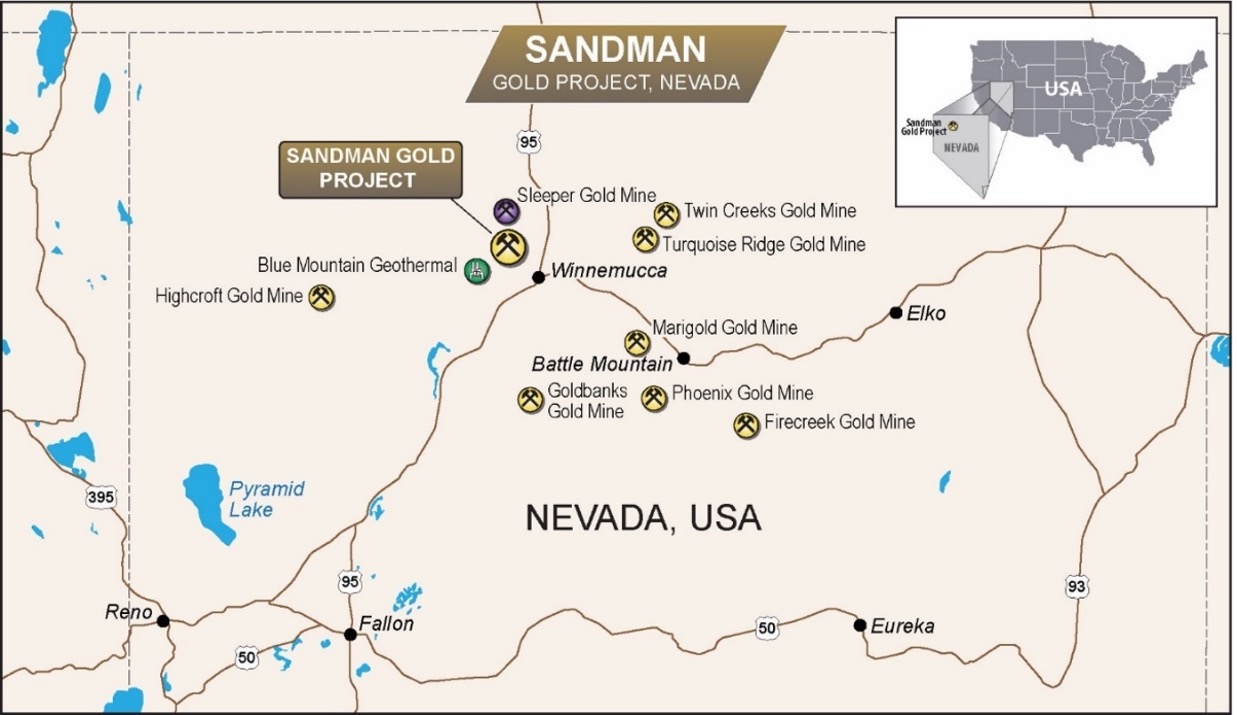
Figure 1. Sandman Project location map of Northern Nevada relative to the surrounding operating gold mines and mineral resources. Reference to the nearby projects is for information purposes only and there are no assurances the Company will achieve the same results.
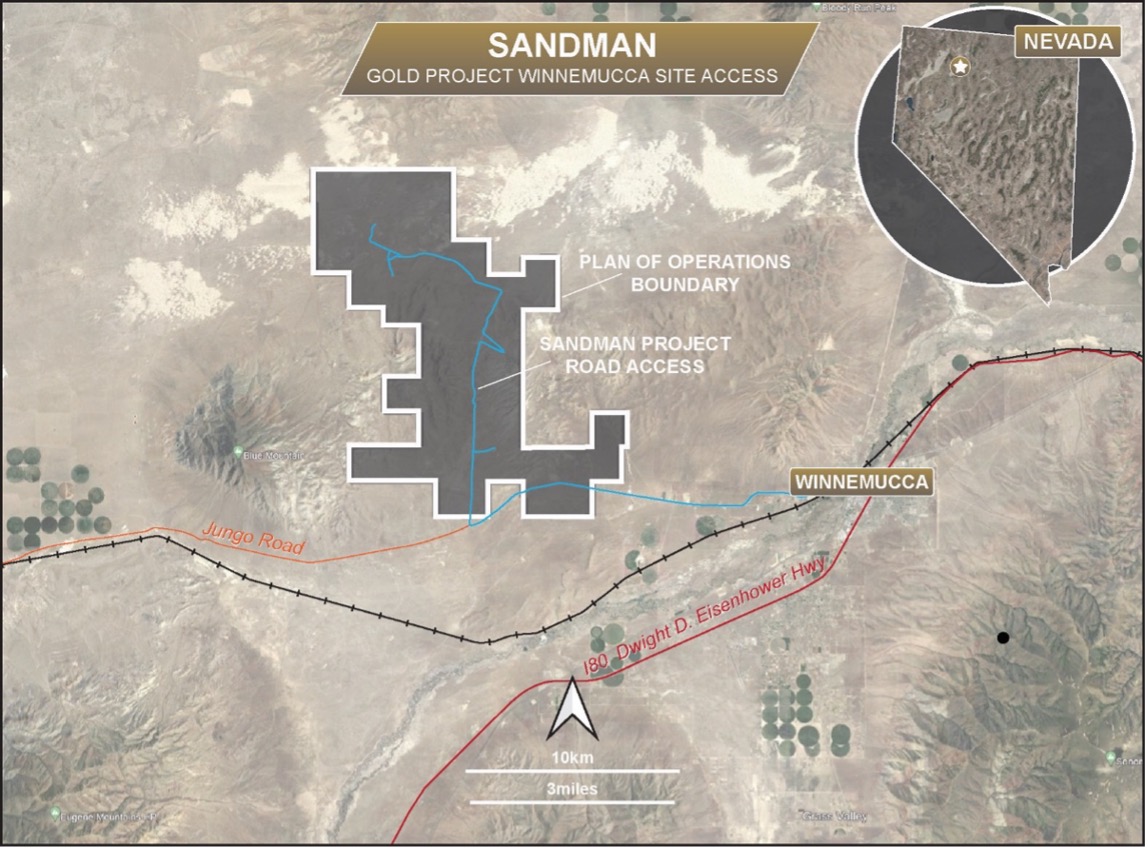
Figure 2. Sandman Project location relative to infrastructure and nearby regional mine servicing town of Winnemucca, Nevada. The project is located on Jungo Road 20-30 kms from Winnemucca.
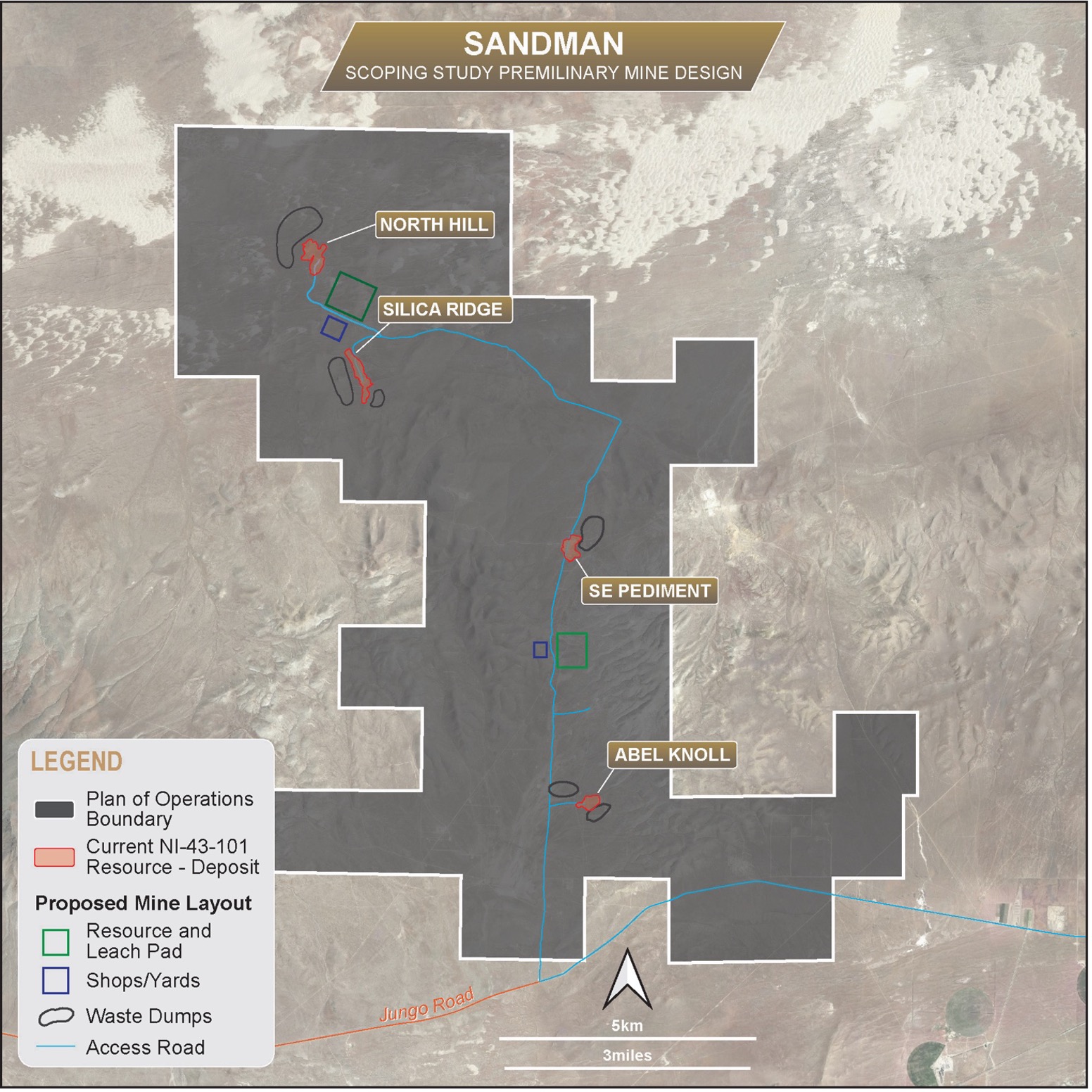
Figure 3. Sandman Scoping Study proposed mine design. This has not changed from the prior Phase 1 study.
EXECUTIVE SUMMARY
The Sandman Project presents strong financial results and a compelling mine opportunity for a stand-alone open pit gold mine, with Phase 1 mining above water table (for five years) commencing at the North Hill deposit, followed by Silica Ridge, Southeast Pediment and Abel Knoll deposits. Upon completion of Phase 1, and the required below water table permitting and dewatering efforts, Phase 2 mining (over four years) is expected to commence immediately in the same order as Phase 1 commencing at North Hill and heading southwards to the Abel Knoll deposit. The two-phase approach is designed to conserve initial pre-production capital while enabling rapid mine commissioning to achieve cashflow and to fund the below water table permit for Phase 2 mining, and also fund further exploration to increase the mine resources.
The mine proposal includes an onsite multi-stage crushing plant, which is mobile and will move progressively from each pit location, with separate dumps and two localized leach pads. The first leach pad will be constructed for North Hill and Silica Ridge, and the second leach pad will be constructed in year 3 and will receive mineralized material feed from Southeast Pediment and Abel Knoll. Leach Pad expansions will be required in years 5 and 6 to accommodate the additional tonnage from Phase 2 mining.
Economics are based upon contract mining, crushing and heap leach as the main processing method. It is planned to load the gold onto activated carbon and then transport the loaded carbon to off-site stripping and refining plants for final gold doré recovery. A simplified mining schedule is anticipated to produce 35,000-40,000 ounces of gold per annum.
Given the North Hill and Silica Ridge deposits outcrop on hill tops at surface, these deposits present the best strip ratio starter pit mine scenarios3. Phase 1 is targeting these low-strip ratio resources to enable rapid permitting (above water table) for mine start-up and initial cash flow. Initial mine production revenue will be used to fund further mine studies, permitting and dewatering efforts to allow the Phase 2 mining below the water table and this is expected be included in future studies.
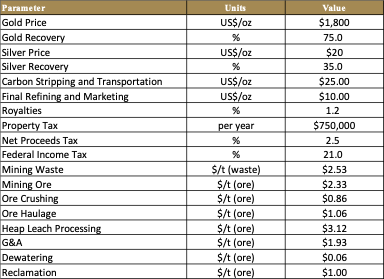
Table 3. Sandman Project Scoping Study mine factors applied to the economic evaluation
Comments
- This scenario includes all material within an optimized pit shell
- Recoveries assumed at 75% for heap leaching. Opportunity exists to optimize recoveries after further metallurgical test work is completed
- Optimized pit shells were applied, not a refined pit design
- Future opportunity exists to increase mine production, as this schedule assumes dayshift-only mining to meet the planned material movement requirements
- Cashflow model includes a 1.2% Royalty
Capital Categories
- Contingency added to capital to cover unknown/unrecognized categories
- Working capital is sufficient to cover 2 months of operating costs
- Capital estimates are based on current quotes and/or information from previous projects (within the past two years) and inflated to 2023 levels
- Engineering Procurement Construction Management (EPCM)
- Earthworks – roads, stockpiles, and yard construction
- Crushing/stacking equipment, multi-stage crushing for 6-8Kt per day, cost estimate includes installation and commissioning, entire system to be mobile and follow mining from pit to pit
- Leach pad and ponds, 5-8Kt per day, cost estimate includes installation and commissioning. Initial pad built near North Hill and Silica Ridge with a second pad built near Southeast Pediment and Abel Knoll in year 3.
- Carbon columns, cost estimate includes installation and commissioning. One set of columns for the initial leach pad and second set to be constructed for the second leach pad
- Sustaining capital includes temporary construction facilities, construction services, supplies, quality control, survey support, construction equipment and safety
- Sample preparation conducted on site with off site gold analysis
- Infrastructure includes portable office, warehouse/parts storage, and a workshop
- Initial purchase or lease of water rights necessary to operate the mine
- Option to purchase additional surface rights included
Operational Categories
- Mining contractor mobilisation for 12-15 equipment units, office space and other resources.
- Contract mining comprises:
- Drilling
- Blasting
- In-pit loading
- Waste haulage to near-pit waste rock stockpile
- Product feed haulage to near-pit stockpile location (for feed to crusher)
- Loader feed into a portable (movable) crusher
- Loading of crushed material into trucks
- Truck haulage to heap leach pad
- Roads/dumps/stockpile maintenance
- Company shall maintain small workforce for project management, administration, SHE permitting-training-compliance, general labor, crushing/heap leach operations, supply chain etc.
- Contractor demobilization at the end of the project life
- Centralised location for diesel, gasoline, lubes, and oils
- Power Generation and Distribution with mobile generators for crushing, pumping and other infrastructure requirements, includes a back-up generator, power poles, transformers for on-site distribution
- Further studies for alternative power solutions are needed as this scenario uses diesel generators
- Water supply and distribution, water well construction and extraction, pumping and piping to supply water for the project. Water usage 3,900 gallons per minute with make-up water consumption rate of 285 gallons per minute
- Additional environmental and hydrogeological baseline studies are required
- Initial purchase or lease of water rights necessary to operate the mine
- Indirect owners’ costs include temporary construction facilities, construction services, supplies, quality control, survey support, construction equipment, safety etc.
Operating Costs
An operating cost estimate has been calculated at US$20.85 per tonne of mineralized material mined and processed for the Project. The estimate relates to all costs to allow production of gold doré, capturing the processing plant facilities, contractor mining, product refining and general and administration (G&A) costs.
| FunctionalArea |
Post-tax CostperTonne
Processed (US$) |
| Mining |
$7.80 |
| Processing |
$5.66 |
| G&A |
$2.99 |
| Other Costs (Royalty, Taxes, etc.) |
$4.40 |
| TotalSiteOperatingCost1 |
$20.85 |
Table 4. Sandman Project operating cost summary.
Basis for Economic calculations (tonnage/grades)
The Company announced its Mineral Resource Estimate on February 2, 2021 with combined Indicated and Inferred ounces totaling 494K ounces of gold and summarized below. Refer to Table 8 for the prior published summary of the Sandman Mineral Resource Estimate in which the majority of the Mineral Resource is Indicated a small amount is Inferred.
- Indicated Mineral Resource of 18,550kt @ 0.73g/t gold for 433kozs of gold
- Inferred Mineral Resource of 3,246kt @ 0.58g/t gold for 61kozs of gold
The Scoping Studies are preliminary in nature, include a small amount of inferred mineral resources that are considered too speculative geologically to have the economic considerations applied to them that would enable them to be categorized as mineral reserves, and there is no certainty that the Scoping Studies will be realized.
A further grade model was created for the Phase 2 Scoping Study to include the 2021 and 2022 drill results and estimate an above water table tonnage and grade model. This was applied to the Scoping Phase 2 Study pit optimization work and the resulting tonnes and grade used In the Phase 2 Study are summarised in Table 5. The water table surface was conservatively defined by first intercept of water in the exploration drill holes. Detailed hydrogeological studies accurately defining the water table are yet to be conducted and will be included in future Studies.

Table 5. Scoping Study tonnes and grade depicting 455K oz contained gold within the pit optimisation
Mining Methods
The Sandman Project is planned to be mined using conventional open pit mining methods on the four (4) separate deposits in the order listed in Table 6. The mining operation schedule is dayshift only with a roster of two production crews on a 4-days on and 4-days off, 12 hours per day.
Pre-production stripping is expected to be minimal as mineralized material is located at or near surface on hill tops where mining is anticipated to begin at the North Hill and Silica Ridge deposits. The pit areas have small shrubs and grasses that can be cleared with planned mining equipment.
Open pit mining is currently envisaged to be by diesel-powered equipment, utilizing a combination of one rotary blasthole rig drilling blastholes, one 8m3 front-end loader (or similar size excavator), and five to six, 70-tonne capacity trucks to handle mineralized material and waste. The mining fleet has sufficient capacity to move up to approximately 6.0Mtpa of total material on a dayshift-only schedule. Support equipment comprising a grader, track dozer(s) and water truck will aid in the mining. Mineralized material will be hauled to the crushing area for stockpiling before being rehandled later for primary crushing. Initially, waste rock will be stored in the waste rock dumps close to the pit to reduce haulage costs. As space and design allows, waste will be backfilled into the pit to reduce haulage costs and surface disturbance.
Haul roads are contemplated to be 9-10m widths for one-way traffic and 18-20m widths for two-way traffic. The final location of the ramps is expected to be optimized to reduce the overall pit slopes and to aid in efficient haulage to various stockpile locations. The pit is considered dry in Phase 1 and wet in Phase 2.
The mine plan was designed to deliver ~2.2Mt of mineralized material per year to the processing facility. The mine plan was based on efficient extraction of mineralized material above the water table in Phase 1 and started at the North Hill deposit (predicted higher-grade and low strip ratio) and then working the deposits in a southerly direction without regard to majority Indicated, and minority Inferred, Mineral Resource categories. Phase 2 mining will continue below the water table also starting at North Hill and working in a southerly direction towards Abel Knoll.
The total estimated mining workforce is 55-60 people, comprising a team of 22 Gold Bull personnel and 30-35 mining contractors (20 production operators, 8 maintenance techs, 5 supervisory staff).
| Period |
Mineralized
Material |
Gold
Grade |
Contained
Gold |
Total
Waste |
Total
Material |
Strip
Ratio |
|
tonnes |
g/t |
ounces |
tonnes |
tonnes |
w:o |
| Year 1 |
1,633,000 |
0.82 |
42,857 |
3,120,000 |
4,753,000 |
1.9 |
| Year 2 |
2,306,000 |
0.77 |
57,143 |
3,833,000 |
6,139,000 |
1.7 |
| Year 3 |
2,685,000 |
0.66 |
57,143 |
2,799,000 |
5,484,000 |
1.0 |
| Year 4 |
2,247,000 |
0.79 |
57,143 |
3,077,000 |
5,324,000 |
1.4 |
| Year 5 |
2,844,000 |
0.57 |
51,714 |
5,371,000 |
8,215,000 |
1.9 |
| Year 6 |
3,195,000 |
0.56 |
57,143 |
7,564,000 |
10,759,000 |
2.4 |
| Year 7 |
2,042,000 |
0.87 |
57,143 |
7,678,000 |
9,720,000 |
3.8 |
| Year 8 |
1,887,000 |
0.94 |
57,143 |
6,608,000 |
8,495,000 |
3.5 |
| Year 9 |
580,000 |
0.94 |
17,571 |
2,031,000 |
2,611,000 |
3.5 |
| Totals |
19,419,000 |
0.73 |
455,000 |
42,081,000 |
61,500,000 |
2.2 |
Table 6. Sandman Project annual mining production schedule for 9 years for the four Sandman deposits.
Recovery Methods
Precious metal recovery from this Scoping Phase 2 Study is through conventional heap leaching and adsorption, desorption, regeneration (ADR) technology for metal extraction from crushed product using industry standard equipment. Processing will involve mineralized material passing through multiple stages of crushing, which will allow for haulage transport and end-dump stacking of the mineralized material onto a heap leach pad. The processing facilities accommodate a leachable tonnage of approximately 19.4Mt of product at a gold grade of 0.73g/t and a process rate of 5,900tpd or 2.2Mtpa. The heap leach pad facilities have been located and designed with expandability for a LOM production increase.
Mineralized material will be delivered to the crushing plant from the open pit and placed in the stockpile adjacent to the crushing plant. The mineralized material will be fed to the crushing plant using a front-end loader and will be crushed and then transported to the heap leach pad via haul trucks. The mineralized material will be stacked onto the heap using industry standard end-dumping and dozer pushing and then leached with a weak cyanide solution to extract the precious metal values. The gold will then be recovered from the pregnant solution in the carbon columns by adsorbing the dissolved gold onto activated carbon, which will be bagged and transported off-site to an external facility to extract gold from the loaded carbon. The stripped carbon will be returned from the external treatment facility to site for continuous reuse in the process plant. The doré will be sent to a contract refiner for final refining.
Mineral Processing
Historical metallurgical test work has been completed over several stages, predominantly from the Silica Ridge, North Hill and Southeast Pediment deposits, mostly by Newmont and Kappes, Cassiday and Associates (KCA) in Reno, Nevada. Recent test work on samples from Abel Knoll were completed by KCA for Gold Bull in 2021.
Historically, relatively extensive bottle roll leach programs were conducted while only limited column leach tests were completed for three of the four deposits. Further test work is required to adequately determine the optimal processing circuit and resulting gold recoveries for the gold mineralization at Sandman. At this stage it is considered likely that a conventional three-stage crush followed by heap leach processing could achieve gold recoveries of 75%. Additional work is required to confirm the crush size and gold recoveries from heap leaching.
Sensitivity Analysis
High level sensitivity analysis of the Sandman Project economics was conducted, indicating the project is most sensitive towards gold price and less sensitive towards operating cost and least sensitive to capital cost. Figure 4 and 5 and Table 7 demonstrate the range of NPV in million dollars over a range of gold prices and include Pre and Post Tax analysis.
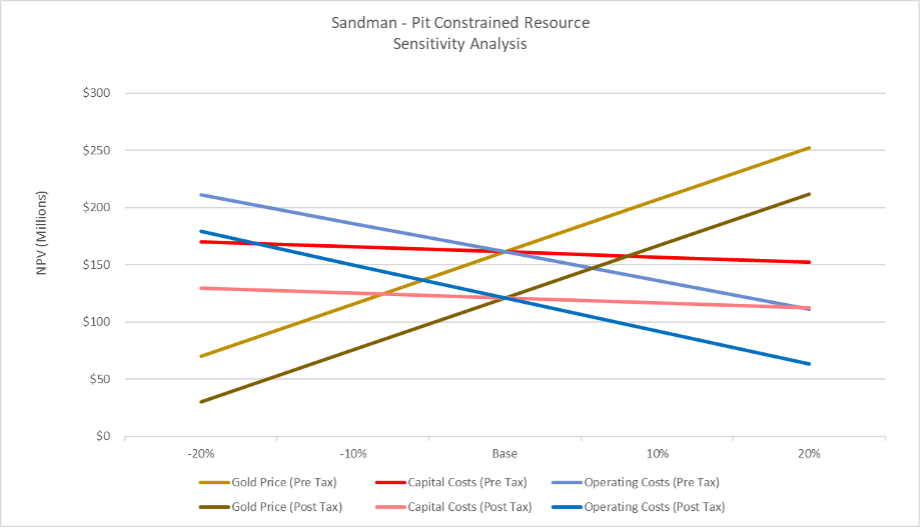
Figure 4. Sandman sensitivity analysis evaluating gold price, capital costs and operating costs both Pre-Tax and Post-Tax analysis.
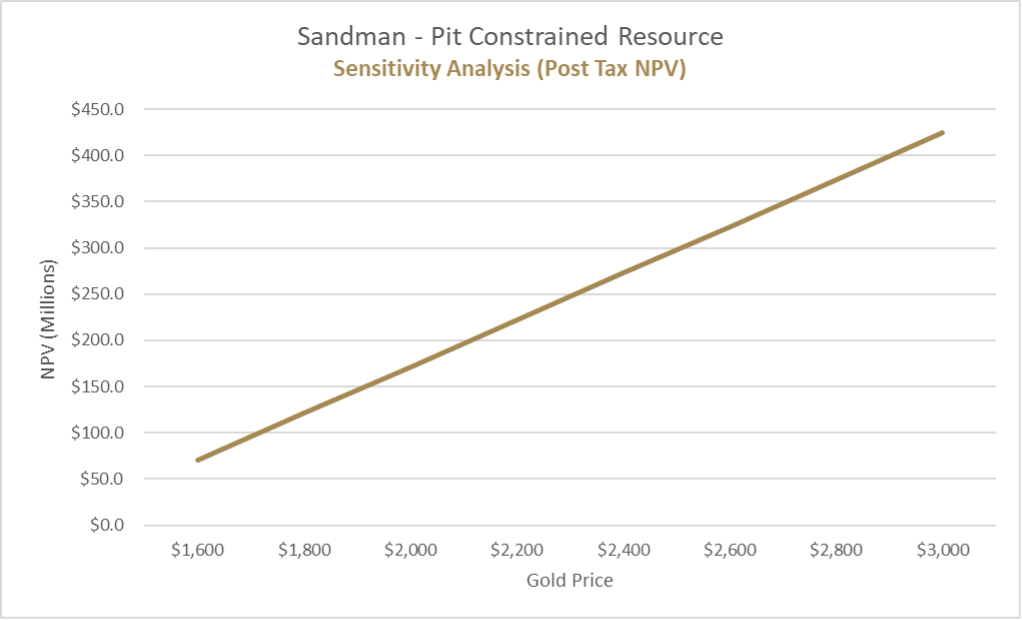
Figure 5. Sandman sensitivity analysis is most sensitive to the gold price
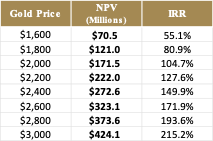
Table 7. Gold price impact on Post-Tax NPV 6% and IRR.
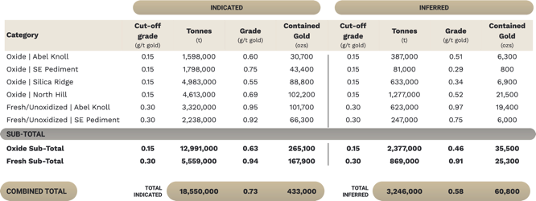
Table 8. January 2021 NI 43-101 Sandman Gold Resource Estimate. Full report available: Sandman-NI-43-101_2021-01-20.pdf (goldbull.ca) Please note that the Sandman 2021 NI 43-101 Resource Estimate does not include drilling conducted by Gold Bull in 2021 and 2022.
NEXT STEPS
Further drilling and metallurgical, geotechnical and hydrogeological studies are required for inclusion in a Preliminary Feasibility Study and for use in mine permitting.
Baseline hydrogeological, cultural, and biological surveys have previously been conducted at Sandman, however, may need to be updated for mine permitting. Additional technical and design optimization studies will also be required for inclusion in a Preliminary Feasibility Study. Infill resource and reserve drilling is required ahead of the mine schedule.
Optional additional exploration is warranted and recommended to expand the current mineral resource base.
CAUTIONARY STATEMENT
This Scoping Study is a preliminary technical and economic study investigating the potential viability of commissioning and running a gold mine at the Sandman Project. The Scoping Study includes a smaller amount of inferred mineral resources that are considered too speculative geologically to have the economic considerations applied to them that would enable them to be categorized as mineral reserves, and there is no certainty that the Scoping Study will be realized.
The Scoping Study in this announcement is based on technical and economic assumptions and assessments which could be further refined and evaluated in a preliminary feasibility study. If the Company were to attempt to bring the Sandman Project into production without established mineral reserves on the project supported by a full feasibility study, the Company cautions that this could result in a higher risk of economic or technical failure of the operation than if a full feasibility study had been prepared demonstrating economic and technical viability.
The Scoping Study is based on material assumptions outlined in this announcement. These include assumptions about the availability of funding and other parameters. While the Company considers all the material assumptions are based on reasonable grounds, there is no certainty they will prove to be correct or that the range of outcomes indicated in this Scoping Study announcement can be achieved or realised. There are no assurances that the Sandman Project will be found to be economic.
To achieve the potential mine development outcomes indicated in the Phase 1 and Phase 2 Scoping Study, significant funding is required as well as further drilling and metallurgical, hydrogeological, and environmental assessments and permits received prior to confirming mining can take place. The Study has focussed only on Phase 1 initial oxide mining of mineralized material above the water table, then Phase 2 mining of material below the water table, using conventional heap leach processing. Investors should note there is no certainty that the Company will be able to raise the required funding when needed, however the Company has concluded that it has a reasonable basis for providing the forward-looking statements included in this announcement and believes that it has a “reasonable basis” to expect it will be able to fund the gold development project upon receiving satisfactory and favourable results for further metallurgical, hydrogeological and environmental studies and permits enabling economic ore extraction. Further studies are required to confirm the proposed mine scenario and confirm assumptions made in this Scoping Study.
It is also possible that such funding may only be available on terms that may be dilutive, or otherwise affect the value of the Company’s existing shares. It is also possible that the Company could pursue other strategies to provide alternative funding options including project finance.
Given the uncertainties involved for the metallurgical, hydrogeological and environmental assessments and permits, investors should not make any investment decision based solely on the results of the Scoping Studies and assume a mine will be developed, however every effort will be made by the Company to progress towards mine development.
ABOUT SANDMAN
In December 2020, Gold Bull purchased the Sandman Project from Newmont. Gold mineralization was first discovered at Sandman in 1987 by Kennecott and the project has been intermittently explored since then. There are four known pit constrained gold resources located within the Sandman Project, consisting of 21.8Mt at 0.7g/t gold for 494,000 ounces of gold; comprising of an Indicated Resource of 18,550kt at 0.73g/t gold for 433kozs of gold plus an Inferred Resource of 3,246kt at 0.58g/t gold for 61kozs of gold. Several of the resources remain open in multiple directions and the bulk of the historical drilling has been conducted to a depth of less than 100m. Sandman is conveniently located circa 25-30 km northwest of the mining town of Winnemucca, Nevada.
QUALIFIED PERSON
The technical information in this news release has been reviewed and approved by Mr. Jerod Eastman, Mr. Steven Olsen, and Mr. Carl E. Defilippi for only the sections which they are responsible.
Mr. Eastman is a Qualified Person under National Instrument 43-101. Mr. Eastman is a Registered Member (#00885850) of the Society for Mining, Metallurgy and Exploration, Inc. and is completely independent of Gold Bull Resources Corp. The information in this news release that relates to mining and cost estimation is based on, and fairly reflects, information compiled and approved by Mr. Eastman.
Mr. Steven Olsen is a Qualified Person under National Instrument 43-101. Mr. Olsen Is a Registered member of the Australian Institute of Geoscientists (#7014) and is completely independent of Gold Bull Resources Corp. The Information in this public announcement that relates to Mineral Resource estimation was produced and approved by Mr. Steven Olsen.
Mr. Carl E. Defilippi is a Qualified Person under National Instrument 43-101. Mr. Defilippi is a Registered Member (#775870) of the Society for Mining, Metallurgy and Exploration, Inc. and is completely independent of Gold Bull Resources Corp. The Information in this new release that only relates to Metallurgy was approved by Mr. Defilippi.
ABOUT GOLD BULL RESOURCES CORP.
Gold Bull’s mission is to grow into a US focused mid-tier gold development Company via rapidly discovering, developing and acquiring additional ounces. The Company’s exploration hub is based in Nevada, USA, a top-tier mineral district that contains significant historical production, existing mining infrastructure and an established mining culture. Gold Bull is led by a Board and Management team with a track record of exploration and acquisition success.
Gold Bull’s core asset is the Sandman Project, located in Nevada which has a 494,000 oz gold resource as per 2021 NI 43-101 Resource Estimate. Sandman is located 23 km south of the Sleeper Mine and boasts excellent large-scale exploration potential.
Gold Bull is driven by its core values and purpose which includes a commitment to safety, communication & transparency, environmental responsibility, community, and integrity.
Cherie Leeden
President and CEO, Gold Bull Resources Corp.
For further information regarding Gold Bull Resources Corp., please visit our website at www.goldbull.ca or email admin@goldbull.ca or phone 778.401.8545.
Cautionary Note Regarding Forward-Looking Statements
Neither the TSX Venture Exchange nor its Regulation Services Provider (as that term is defined in the policies of the TSX Venture Exchange) accepts responsibility for the adequacy or accuracy of this release.
This news release contains certain statements that may be deemed “forward-looking statements” with respect to the Company within the meaning of applicable securities laws. Forward-looking statements are statements that are not historical facts and are generally, but not always, identified by the words “expects”, “plans”, “anticipates”, “believes”, “intends”, “estimates”, “projects”, “potential”, “indicates”, “opportunity”, “possible” and similar expressions, or that events or conditions “will”, “would”, “may”, “could” or “should” occur. Although Gold Bull believes the expectations expressed in such forward-looking statements are based on reasonable assumptions, such statements are not guarantees of future performance, are subject to risks and uncertainties, and actual results or realities may differ materially from those in the forward-looking statements. Such material risks and uncertainties include, but are not limited to, the Company’s ability to raise sufficient capital to fund its planned activities at the Sandman Project; the timing and costs of future activities on the Company’s properties; maintaining its mineral tenures and concessions in good standing, to explore and develop its projects, to repay its debt and for general working capital purposes; changes in economic conditions or financial markets; the inherent hazards associates with mineral exploration and mining operations, future prices of gold and other metals, changes in general economic conditions, accuracy of mineral resource and reserve estimates, the potential for new discoveries, the ability of the Company to obtain the necessary permits and consents required to explore, drill and develop the projects and if obtained, to obtain such permits and consents in a timely fashion relative to the Company’s plans and business objectives for the projects; the general ability of the Company to monetize its mineral resources; and changes in environmental and other laws or regulations that could have an impact on the Company’s operations, compliance with environmental laws and regulations, dependence on key management personnel and general competition in the mining industry. Forward-looking statements are based on the reasonable beliefs, estimates and opinions of the Company’s management on the date the statements are made. Except as required by law, the Company undertakes no obligation to update these forward-looking statements in the event that management’s beliefs, estimates or opinions, or other factors, should change.
_________________
1 announced September 12 2022 titled “Gold Bull’s Sandman Project Scoping Study points to near-term production potential” with report filed on October 27, 2022
2 applied Federal Income Tax, NV Excise Tax, Net Proceeds Tax
3 Note both Southeast Pediment and Silica Ridge also have mineralisation at surface but a not on hill tops, these two deposits are at planar level so the strip ratio is slightly higher.
Photos accompanying this announcement are available at
https://www.globenewswire.com/NewsRoom/AttachmentNg/bdf7ff79-65be-41ed-957b-5120f906e44e
https://www.globenewswire.com/NewsRoom/AttachmentNg/bdc78d90-08e6-4a8e-912c-ec1ab5f40b68
https://www.globenewswire.com/NewsRoom/AttachmentNg/fce71dec-498f-4b4d-9562-3c7af21e217e
https://www.globenewswire.com/NewsRoom/AttachmentNg/3ec7882d-b9b5-471e-a63a-baf0d00eb247
https://www.globenewswire.com/NewsRoom/AttachmentNg/058cf20b-a2b8-40d6-8a95-b57e5423c5b8
https://www.globenewswire.com/NewsRoom/AttachmentNg/d669e692-a1ff-4714-9431-cf78d7c633a2
https://www.globenewswire.com/NewsRoom/AttachmentNg/301d87bd-5e67-413a-a862-63ffa66ffb31
https://www.globenewswire.com/NewsRoom/AttachmentNg/d64daa49-9898-4f06-a46b-d521d0541e4d
https://www.globenewswire.com/NewsRoom/AttachmentNg/a8cad12f-0555-4353-8b0c-9628796d7909


